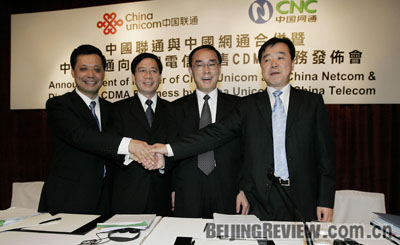|

HAND IN HAND: China Unicom and China Netcom will soon merge into the new China Unicom in October. China Netcom will be delisted from the stock exchanges as a result
During the Beijing Olympic Games last month, billions of spectators around the world watched sports competitions and matches on their televisions and computers.
"They were all connected to the Games through the networks of China Netcom," said Zhao Jidong, senior Vice President of China Netcom, at a recent press conference. "Moreover, nearly all the Olympic-related pictures and newsletters were spread throughout the world via China Netcom services."
But supporting the 2008 Olympic Games was China Netcom Group Corp. (Hong Kong) Ltd.'s last public play. Shortly after the Games ended on August 24, the nine-year-old company, began stock exchange delisting procedures.
On August 15, China Unicom (Hong Kong) Ltd., the country's second largest mobile operator, issued a notice informing its shareholders of its merger with China Netcom, the second largest fixed-line operator. It said China Netcom would be delisted from the Hong Kong and New York stock exchanges and become a wholly owned subsidiary of China Unicom.
On the same day, the two companies jointly published a notice urging China Netcom shareholders to exchange their shares for China Unicom shares. One China Netcom share could be exchanged for 1.508 China Unicom shares, and one China Netcom American Depository Receipt could be exchanged for 3.016 China Unicom ADRs. Consequently, the two listed companies would merge and be renamed China Unicom (Hong Kong) Ltd.
China Netcom's founding
When China Netcom was founded in 1999, the Chinese broadband industry was stumbling at the starting line. During its first three years of operation, the company lacked a coherent strategy and tried to make money any way it could.
In 2001, the government decided to weaken China Telecom Group's dominant position in telecommunications services. As a result, China Telecom and China Netcom were reorganized and divided up service areas in May 2002. They agreed that China Netcom would offer services in the northern part of the country to about 10 provinces, including municipalities and autonomous regions, while China Telecom would offer services in the southern part.
The reorganizations not only had given considerable market share to China Netcom, but also granted the company an opportunity to revive itself. At that time, China had established relatively comprehensive telecommunications network infrastructure. China Netcom's most profitable year was 2002, when its broadband service grew at a fast clip of about 30 percent each month and accounted for a quarter of the company's income. Since that time, China Netcom had been able to turn over a new leaf.
China Netcom and China Telecom are currently the top two fixed-line telecommunications service providers on the mainland. Although China Telecom is number one in terms of revenue and subscribers, China Netcom's total assets had surmounted 191.8 billion yuan ($28 billion) at the end of June 2008. It also had 23.36 million broadband users and 108.5 million fixed-line users.
To develop 3G services on the mainland, the government reshuffled the telecom industry again earlier this year to guarantee that three 3G licenses would be issued to three major telecom service providers whose powers are balanced. On May 24, the Ministry of Industry and Information Technology, National Development and Reform Commission, and the Ministry of Finance jointly announced that the country's six state-owned telecommunications operators would be merged into three. Among these, China Unicom and China Netcom would be merged into the new China Unicom, which would be responsible for developing the country's WCDMA standard. Two other newly merged operators would receive the other licenses. But for China Netcom, the merger would mean the end of its popular brand.
Serving the Olympics
The Beijing Olympics had been an inseparable part of China Netcom's nine years of development. On July 22, 2004, the company signed an agreement with the Beijing Organizing Committee for the Games of the 29th Olympiad to become the sole telecommunications partner of the Olympics, because it mainly covered the northern part of the country where the Games would be held.
China Netcom had invested a total of 1.47 billion yuan ($215 million) in its fixed-line telecommunications network between 2004 and 2008 and developed 26 telecommunications products dedicated to the Olympics, Zhao said at the press conference. All in all, the company spent no less than 2 billion yuan ($292 million) on the Beijing Games.
The Olympics Games brought many of its corporate sponsors enormous profits and helped boost their brand recognition internationally. But China Netcom will not be able to enjoy these benefits once the merger occurs. Zuo Xunsheng, the company's chairman, told Xinhua News Agency that he regretted the disappearance of the company's brand. But he also noted that because the company is a large-scale, central state-owned enterprise, he understood that it had to be sacrificed in the latest telecommunications industry reorganization.
Zuo said he was confident about the future of the new China Unicom. He believes it will become the country's largest 3G operator and control as much as one third of the market by 2010. | 